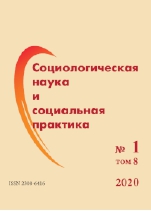Организационно-методологические аспекты дистанционного исследования проблем цифровизации регионов с различным уровнем социокультурной модернизации. Часть 2
Аннотация
Литература
Атлас модернизации России и её регионов: социоэкономические и социокультурные тенденции и проблемы / Под ред. Н. И. Лапина М.: Весь Мир, 2016. 360 с.
Кравченко, С. А. Многоликость метаморфоз: о новациях двух канадских социологов // Социологические исследования. 2019. № 2. С. 26–35. DOI: 10.31857/S013216250003999
Тихонов, А. В. Реформирование работы органов власти и управления как неотложная национальная проблема // Научный результат. Социология и управление. 2017. Т. 3. № 4. С. 70–106. DOI: 10.18413/2408-9338-2017-3-4-70-106
Указ Президента Российской Федерации «О Стратегии научно-технологического развития Российской Федерации» [Электронный ресурс] // Президент России: [сайт]. URL: http:// www.kremlin.ru/acts/bank/41449 (дата обращения: 10.08.2019).
Цифровизация должна стать для России не опасностью, а возможностью // Business Excellence. 2018. № 4. C. 44–50.
Tapscott, D. The Digital Economy: Promise and Peril In The Age of Networked Intelligence. NY: McGraw-Hill.1994. 368 p.
Negroponte, N. Being Digital. NY: Knopf. 1995. 256 p.
Поступила: 24.09.2019
Опубликована: 01.04.2020








 Издатель: Федеральное государственное бюджетное учреждение науки
Издатель: Федеральное государственное бюджетное учреждение науки